 W
WBai Chongxi was a Chinese general in the National Revolutionary Army of the Republic of China (ROC) and a prominent Chinese Nationalist leader. He was of Hui ethnicity and of the Muslim faith. From the mid-1920s to 1949, Bai and his close ally Li Zongren ruled Guangxi province as regional warlords with their own troops and considerable political autonomy. His relationship with Chiang Kai-shek was at various times antagonistic and cooperative. He and Li Zongren supported the anti-Chiang warlord alliance in the Central Plains War in 1930, then supported Chiang in the Second Sino-Japanese War and the Chinese Civil War. Bai was the first defense minister of the Republic of China from 1946 to 1948. After losing to the Communists in 1949, he fled to Taiwan, where he died in 1966.
 W
WChen Cheng was a Chinese political and military leader, and one of the main commanders of the National Revolutionary Army during the Second Sino-Japanese War and the Chinese Civil War.
 W
WClaire Lee Chennault was an American military aviator best known for his leadership of the "Flying Tigers" and the Republic of China Air Force in World War II.
 W
WFu Zuoyi was a Chinese military leader. He began his military career in the service of Yan Xishan, and he was widely praised for his defense of Suiyuan from the Japanese. During the final stages of the Chinese Civil War, Fu surrendered the large and strategic garrison around Beiping to Communist forces. He later served in the government of the People's Republic of China as Minister of the Hydraulic Ministry.
 W
WGu Zhutong, courtesy name Moshan (墨山), was a military general and administrator of the Republic of China.
 W
WGuan Linzheng was a highly successful Chinese general in the Kuomintang who fought against both the Communists and the Imperial Japanese Army, and was a recipient of Order of Blue Sky and White Sun, the highest honor for a Chinese Nationalist commander.
 W
WHe Yingqin, also Ho Ying-chin, was a politician and one of the most senior generals of the Kuomintang (KMT) during Republic of China, and a close ally of Chiang Kai-shek.
 W
WHu Lien was a Chinese Nationalist general who participated in the Northern Expedition, anti-communist Encirclement Campaigns, Second Sino-Japanese War and Chinese Civil War.
 W
WHu Zongnan, courtesy name Shoushan (壽山), was a Chinese general in the National Revolutionary Army and then the Republic of China Army. Together with Chen Cheng and Tang Enbo, Hu, a native of Zhenhai, Ningbo, formed the triumvirate of Chiang Kai-shek's most trusted generals during the Second Sino-Japanese War. After the retreat of the Nationalists to Taiwan in 1949, he also served as the President's military strategy advisor until his death in 1962.
 W
WHuang Qixiang was a Chinese military commander and statesman. He led the Chinese Action Committee for National Liberation in 1933 during the short-lived People's Revolutionary Government of the Republic of China.
 W
WLee Tien-yu is a retired ROC Air Force general and former defense minister of the Republic of China (Taiwan). He took office after the new premier, Chang, was inaugurated.
 W
WLi Mi was a high-ranking Nationalist general who participated in the anti-Communist Encirclement Campaigns, Second Sino-Japanese War and Chinese Civil War. He was one of the few Kuomintang commanders to achieve notable victories against both Chinese Communist forces and the Imperial Japanese Army. Following the founding of the People's Republic of China in 1949, he withdrew his forces to Burma and Thailand, where he continued to carry out guerrilla raids into Communist-held territory.
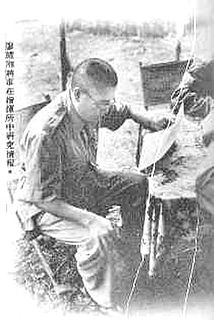 W
WLiao Yiaoxiang, was a high-ranking Kuomintang commander who successful fought against both the Imperial Japanese Army and Chinese Communist forces. Apart from General Sun Liren, he was one of the few Nationalist commanders who graduated from a military academy in the West. After the end of the Second Sino-Japanese War, he served as a field commander in Manchuria until his capture by Marshal Lin Biao's Manchurian Field Army in the Liaoshen Campaign. General Liao was held for 12 years as a prisoner of war until 1961 and died seven years later during the Cultural Revolution.
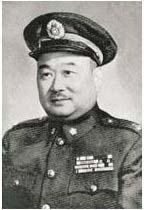 W
WLiu Zhi was a prominent Kuomintang military and political leader in the Republic of China.
 W
WLiu Ruming, Liu Ju-ming, 刘汝明; 12 May 1895 – 28 April 1975) was a ROC Army general during the Warlord Era, Second Sino-Japanese War and Chinese Civil War.
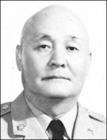 W
WLiu Yuzhang, nicknamed the "Bald General", was a prominent Chinese (Kuomintang) general. He was one of the very few KMT commanders who could defeat both the Imperial Japanese Army and Communist PLA in the Second Sino-Japanese War and Chinese Civil War, respectively.
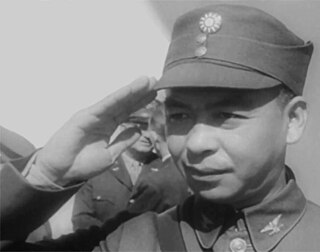 W
WMao Bangchu or Mow Pang Tzu was a high-ranking military officer in the Chinese Chiang Kai-shek government. He was the main figure in an embezzlement scandal that pitched him against the Taiwan government in the early fifties. The charges and countercharges of fraud and misappropriation of millions of dollars, ensuing legal battles, and John-le-Carré-like plots involving private detectives, Mexican prisons, night-club dancers, US Congressmen, suspicious deaths, and the US Supreme Court, were covered in over 2,000 articles published in the US, China, Australia, India, and many other countries around the world.
 W
WPang Bingxun was a high-ranking nationalist military commander who fought against the Imperial Japanese Army and Chinese Communist Army. He stopped the IJA 5th Division led by General Seishirō Itagaki, one of the principal architects of the 1931 Manchurian incident, from capturing Linyi and converging with General Rensuke Isogai's IJA 10th Division at Tai'erzhuang District, foiling their plan to assault Xuzhou.
 W
WPhạm Văn Đổng was a South Vietnamese general. In 1965, as military governor of Saigon, he had successfully repressed Buddhist mobs instigated by Thích Trí Quang of the Ấn Quang group and Thích Tâm Châu of Việt Nam Quốc Tự. With his commanding skills and knowledge, Đổng was regarded highly by American and French officers, and well respected by many ARVN officers. A staunch nationalist and anti-communist, he was considered an ally to the labor union, the Northern Catholics, several Việt Nam Quốc Dân Đảng factions, multiple Đại Việt groups, Việt Nam Cách Mạng Đồng Minh Hội high-ranking members, Duy Dân and Hòa Hảo leaders.
 W
WQiu Qingquan was a ROC Army general who excelled himself in Northern Expedition, anti-communist Encirclement Campaigns, Second Sino-Japanese War, and Chinese Civil War. In the Huaihai Campaign, which was determining battle of the Chinese Civil War, he failed to save General Huang Baitao's 7th corps and later committed suicide on the battlefield.
 W
WShen Yi-ming was a Taiwanese military officer who served as a Republic of China Air Force general and the Chief of the General Staff, Deputy Minister of National Defense for Policy, and Commander of the ROC Air Force.
 W
WSòng Zhéyuán (宋哲元) was a Chinese general during the Chinese Civil War and Second Sino-Japanese War (1937–1945).
 W
WSun Li-jen was a Chinese Nationalist (KMT) general, a graduate of Virginia Military Institute, best known for his leadership in the Second Sino-Japanese War and the Chinese Civil War. His military achievements earned him the laudatory nickname "Rommel of the East". His New First Army was known as the "Best Army under heaven" and credited with effectively confronting Japanese troops in the 1937 Battle of Shanghai and in the Burma Campaign, 1943–1944.
 W
WTang Shengzhi was a Chinese warlord during the Warlord Era, a military commander during the Second Sino-Japanese War and a politician after World War II.
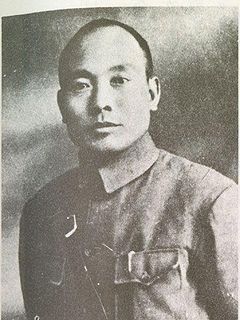 W
WTang Enbo (1898–1954) was a Nationalist general in the Republic of China.
 W
WWang Yaowu was a high-ranking KMT general and the Governor of Shandong Province who successfully fought against both the Imperial Japanese Army and the Chinese Communists. In September 1948, Communist forces launched the Battle of Jinan. Wang was captured and held as a prisoner of war until his pardon and release in 1959. During the Cultural Revolution he came under attack by the Red Guards for being a former nationalist commander and died of a heart attack in 1968.
 W
WGeneral Albert Coady Wedemeyer was a United States Army commander who served in Asia during World War II from October 1943 to the end of the war. Previously, he was an important member of the War Planning Board which formulated plans for the Invasion of Normandy. He was General George Marshall's chief consultant when in the Spring of 1942 he traveled to London with General Marshall and a small group of American military men to consult with the British in an effort to convince the British to support the cross channel invasion. Wedemeyer was a staunch anti-communist. While in China during the years 1944 to 1945 he was Chiang Kai-shek's Chief of Staff and commanded all American forces in China. Wedemeyer supported Chiang's struggle against Mao Zedong and in 1947 President Truman sent him back to China to render a report on what actions the United States should take. During the Cold War, Wedemeyer was a chief supporter of the Berlin Airlift.
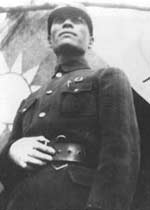 W
WXie Jinyuan was a Chinese Nationalist military officer famous for commanding the Defense of Sihang Warehouse during the Battle of Shanghai in the Second Sino-Japanese War.
 W
WXue Yue was a Chinese Nationalist military general, nicknamed by Claire Lee Chennault of the Flying Tigers as the "Patton of Asia" and called the "God of War" (戰神) by the Chinese.
 W
WYan Xishan was a Chinese warlord who served in the government of the Republic of China. He effectively controlled the province of Shanxi from the 1911 Xinhai Revolution to the 1949 Communist victory in the Chinese Civil War. As the leader of a relatively small, poor, remote province, he survived the machinations of Yuan Shikai, the Warlord Era, the Nationalist Era, the Japanese invasion of China and the subsequent civil war, being forced from office only when the Nationalist armies with which he was aligned had completely lost control of the Chinese mainland, isolating Shanxi from any source of economic or military supply. He has been viewed by Western biographers as a transitional figure who advocated using Western technology to protect Chinese traditions, while at the same time reforming older political, social and economic conditions in a way that paved the way for the radical changes that would occur after his rule.
 W
WZhang Fakui CBE was a Chinese Nationalist general who fought against northern warlords, the Imperial Japanese Army and Chinese Communist forces in his military career. He served as commander-in-chief of the 8th Army Group and commander-in-chief of NRA ground force before retiring in Hong Kong in 1949.
 W
WZhang Zizhong was a general of the Chinese National Revolutionary Army (NRA) during the Second Sino-Japanese War. Born in Linqing, Shandong, he was the highest-ranked officer and the only Army group commander of the NRA to die in the war. He was killed-in-action during the Battle of Yichang after refusing to retreat from the front lines. He showed great valor in the field and was regarded as one of the most valiant and respectable Chinese generals by the Imperial Japanese Army during the Second Sino-Japanese War. Because he was lieutenant general with the effective rank of full general at the time of his death, and was posthumously promoted to full general, he was also one of the highest-ranked Allied officers killed in action in World War II. His mausoleum is situated in Beibei District, Chongqing. There are roads named after him in Shanghai, Beijing, Tianjin and Wuhan.
 W
WZheng Dongguo was a field commander in the Republic of China National Revolutionary Army. He took part in the Second Sino-Japanese War, and was active in southern China and in the Burma theatre of the war, drawing troops from Yunnan. After the Japanese surrender in 1945, he was an important commander in the Chinese Civil War serving under Du Yuming and Chen Cheng in Manchuria.